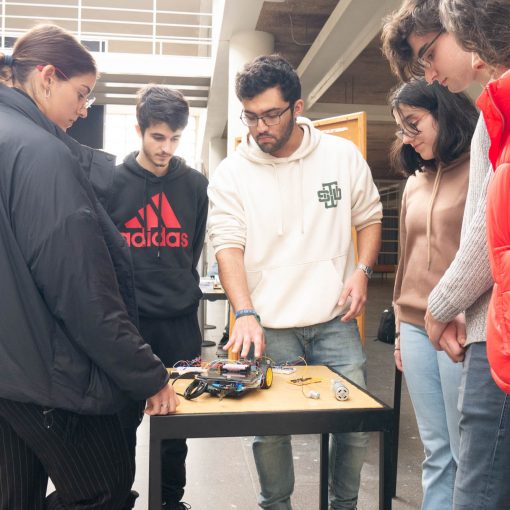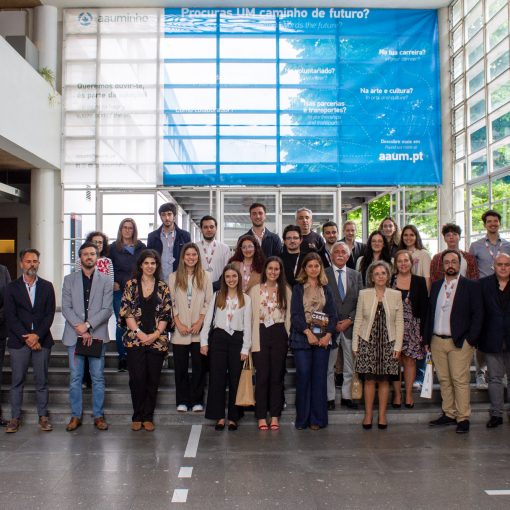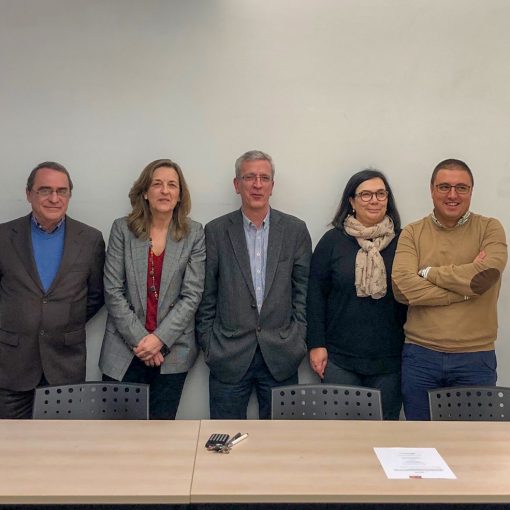Students are already testing their football robots in China, with the competition kicking off on 15 August
A team of students from the School of Engineering at the University of Minho will represent Portugal in the first world football competition between humanoid robots in a ‘5-a-side’ format, taking place from 15 to 17 August in Beijing, China. This tournament will feature 30 university teams from countries such as the Netherlands, Brazil, Germany and China and is part of the 1st edition of the World Humanoid Robot Games.
The Guimarães group has been training in the host city since 19 July. All teams use the Chinese Booster Robotics T1 humanoid, which is 1.2 metres tall and weighs 30 kg, with powerful dribbling and ball control algorithms that allow it to pass, shoot, defend, tackle and even get up after falling. However, it is necessary to refine and customise goalkeeping, obstacle avoidance and shooting systems, and a specific ‘foot’ for the robot has even been created at UMinho. This month of preparation also includes software improvements in the robots’ position on the field, decision-making and, above all, the strategy to achieve real cooperation between the robots, which is essential for success in this competition, scheduled to take place at the iconic Ice Ribbon, next to the venue that hosted the 2008 Olympics.
‘The organisation chose leading universities in the development of robotics and artificial intelligence, including seven teams from four European countries, and it is a great honour and responsibility to take Portugal to the highest level of research in this area,’ says Professor Fernando Ribeiro, who coordinates the Portuguese team and the Automation and Robotics Laboratory (LAR) at UMinho. ‘There have already been competitions with humanoids in 2×2 and 3×3 formats, but 5×5 is unprecedented and the ten robots cannot all move at once, so it requires good strategies, which is why they called us,’ he explains.
Participating from the Minho academy are master’s and doctoral students in Industrial Electronics, Mechatronics and Mechanics – Daniel Borges, Ana Carolina Lopes, Constantino Oliveira, José Silva, António Ribeiro, Etvaldo Neto, Pedro Fernandes and Tiago Ribeiro – accompanied by lecturer Gil Lopes. Last weekend, they took a break to visit the Great Wall of China and the Forbidden City.
The scientific community predicted that by 2050, the best team of robot footballers could play against the world champion men’s team. For now, the robots’ talent ‘will be equivalent to that of 5- or 6-year-old children,’ but with the exponential development of humanoid robots and AI, that date may be brought forward considerably.
Unique journey
LAR-UMinho is one of Europe’s leading centres for dissemination and research in the field, combining robotic autonomy, human-machine interaction, and social and industrial applications. It was founded in 1997 and frequently participates in international competitions, having already won categories in RoboCup and Euro RoboCup. It has organised events such as the European RoboCup 2022, the National Robotics Championship (several editions) and RoboParty (annual since 2007), the world’s largest educational robotics event, with 17 editions in Guimarães and extensions in Lisbon, Brazil, Germany, Canada and Denmark.
LAR has developed several robotic innovations over the years, such as the Charmie home assistant, an omnidirectional chair and a golf ball picker. In robotic football, the group pioneered a strong kicking device with an electromagnet, algorithms for locating the robot on the field and strategies for mandatory cooperation between robots in the game. For his contributions in this field, Fernando Ribeiro recently received the Gerhard Kraetzschmar Award at RoboCup 2025. He also received the Order of Public Instruction commendation from the President of the Republic in 2005. He is also president of the Portuguese Robotics Society and editor of the magazine ‘Robótica’.
+Info: instagram.com/lar_uminho, facebook.com/lar.uminho, www.humanoidrobotgames.com , https://www.robotica.pt/uminho-competicao-futebol-robots-humanoides/
SOURCE: UMinho






